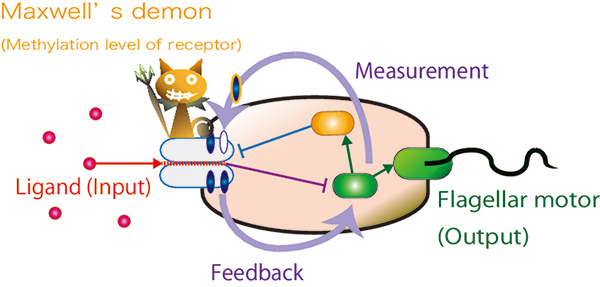How "Maxwell's demon" works inside living cells
How "Maxwell's demon" works inside living cells
—A new approach to biological chemotaxis based on a unified theory of information and thermodynamics
Information processing in living systems is vital to maintain life, which has distinct properties from artificial communication with error correction coding. It has been an important problem to understand the fundamental principle that makes information processing in living systems accurate and robust.
The research group of Dr. Sosuke Ito, JSPS research fellow in Department of Physics, Tokyo Institute of Technology, and Associate Professor Takahiro Sagawa in Department of Applied Physics, School of Engineering, The University of Tokyo has studied this problem, and found a novel mechanism of information processing in living cells, on the basis of a unified theory of information and thermodynamics (i.e., information thermodynamics).
Information thermodynamics is related to a long-standing paradox in physics called "Maxwell's demon." The demon is a being that observes individual molecules and utilizes its information to reduce the thermodynamic entropy. The demon is not just a hypothetical being, but indeed exists in living systems as a molecular machine. The research group focused on the role of the demon in E. coli cells, and succeeded to reveal the mechanism of adaptive information processing of E. coli bacterial chemotaxis, from the viewpoint of information thermodynamics.
In particular, the research group found a quantitative relationship between information flow inside E. coli cells and the robustness of adaptation against environmental noise. Moreover, the research group found that information processing of E. coli bacterial chemotaxis is inefficient (dissipative) as a conventional thermodynamic engine, but is efficient as an information thermodynamic engine. This research is the first departure toward a new direction of research of biological information processing on the basis of information thermodynamics.
This work was published in Nature Communications.

Figure. Schematic of "Maxwell's demon" inside E. coli cells
Reference
Authors: |
Sosuke Ito and Takahiro Sagawa |
Title of original paper: |
Maxwell's demon in biochemical signal transduction with feedback loop |
Journal: |
Nature Communications |
DOI : |
|
. Any information published on this site will be valid in relation to Science Tokyo.



